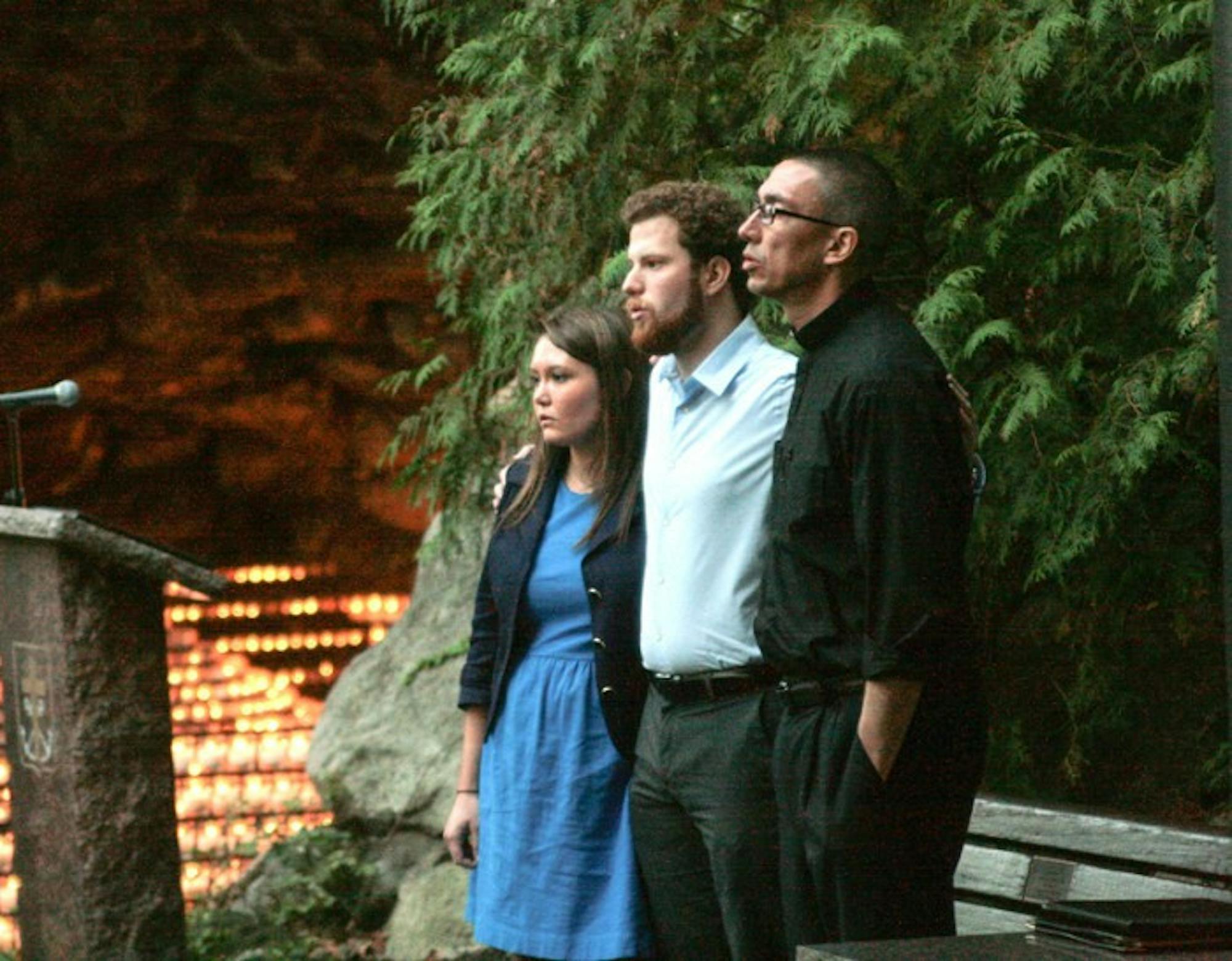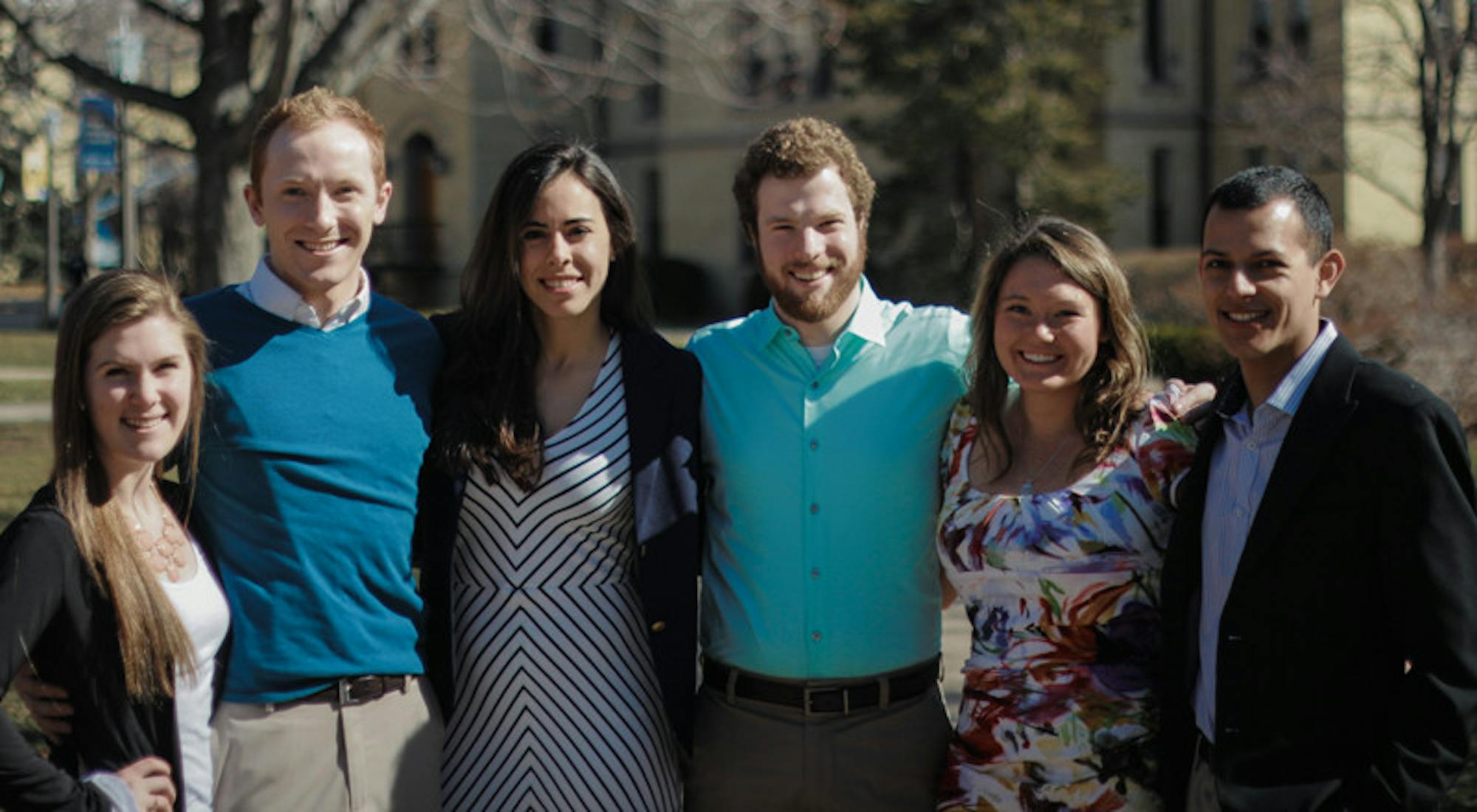By the time he graduated in May 2014, Alex Coccia was one of the most recognizable people at Notre Dame.
He earned two monograms with the varsity fencing team, which won the 2011 NCAA title when he was a freshman.
He majored in Africana Studies and Peace Studies, conducted research in Rwanda, served as a three-year FIRE starter peer educator in the Gender Relations Center and founded the 4 to 5 Movement to educate and empower LGBTQ allies on campus.
While serving as the 2013-14 student body president, he led the “One is Too Many” campaign against campus sexual assault, helped change admissions policies so undocumented students could attend Notre Dame and worked to improve the campus climate for LGBTQ students.
He earned a Truman-Albright Fellowship and currently works in the Department of Health and Human Services in Washington D.C., addressing issues from climate change to domestic violence prevention.
And, as of last weekend, he became Notre Dame’s 15th Rhodes Scholar, the first since 2002.
“It’s a big honor, and I’m very thankful,” Coccia said. “I see it as a team effort, though, so I wish I could be celebrating with people on campus.”

Rhodes Scholarships
According to the Rhodes Trust website, 80 scholars from across the world are selected annually according to criteria outlined by the will of Cecil Rhodes. The scholarship provides funding for students to enroll in a program of their choice at the University of Oxford in England.
The website lists the four criteria from Rhodes’ will as: “literary and scholastic attainments; energy to use one’s talents to the full, as exemplified by fondness for and success in sports; truth, courage, devotion to duty, sympathy for and protection of the weak, kindliness, unselfishness and fellowship; moral force of character and instincts to lead, and to take an interest in one’s fellow beings.”
“What I proposed for my program of study as a Rhodes Scholar was that I really wanted to engage in social and economic policy with a framework of social inclusion,” Coccia said. “I applied for Rhodes last year as well as this year, and both years have just felt like there was an immense team supporting me.
“I had faculty mentors who took time out of their schedules to prep me or write recommendation letters and my fellow students who helped me articulate what I wanted to do with the scholarship, so it feels like it’s really been a team effort.”
Formative time at Notre Dame
Coccia said his interest in social policy is “a natural trajectory” from his work at Notre Dame, which focused on inclusion in many forms.
“My academic experience in Africana Studies and Peace Studies helped me begin to ask the right questions that I could apply to my work in the [Progressive Student Alliance] or in student government,” he said.
Nancy Joyce, a 2014 graduate and student body vice president for 2013-14, said she witnessed firsthand how Coccia embodies the Rhodes criteria.
“During the time that Alex and I worked together, it was always very clear to me that Alex was – and is – motivated by the stories and experiences of those without a voice, and is willing to take up the fight for those individuals and groups,” she said. “Whether working for the establishment of Notre Dame’s first [Gay-Straight Alliance], for the healing of those affected by sexual violence, for the welcoming of undocumented students at Notre Dame or for the support of socioeconomically disadvantaged students on our campus, Alex has always been a champion of those who need one.”
Ernesto Verdeja, director of undergraduate studies for the Kroc Institute for International Peace Studies said he was “delighted, but not surprised” by the news.
“In his time here as a Peace Studies student at the Kroc Institute, he excelled in his studies and became a noted leader on campus,” Verdeja said. “He has distinguished himself as a scholar and a leader, and I wish him all the best at Oxford.”
Joyce said watching both of Coccia’s Rhodes application processes makes her “genuinely thrilled and incredibly excited for him.”
“Winning the Rhodes is such a well-deserved opportunity and will only serve to better enable Alex to continue championing the causes and people that most need his truth, courage, devotion, leadership and moral force of character,” she said.

Coccia said his work at the Department of Health and Human Services has given him broad exposure to public policy and shown him firsthand how public social and economic policies are interwoven.
“It’s easy to silo things, but it’s taught me that a holistic framework for government is what’s important in terms of addressing an agenda and what we owe to each other as human beings and citizens,” he said. “I’ve been working on projects that are within my interest areas and that expand my interests.”
The comparative social policy program at Oxford appeals to him because “it’s a good balance between theory and the nuts and bolts of how to make policies work,” Coccia said.
“Social inclusion as a policy framework is being discussed in the United Kingdom and France, and it’s a stated part of the comparative social policy curriculum [at Oxford],” he said. “I’ve been interested in the theoretical foundations for policy and policymaking, and from what I’ve read, the comparative degree does a great job showing the implications of how we approach public policy and how it gets shaped.”
The past few years have given him a “much greater clarity” for his future plans, Coccia said, and he hopes to get involved in public policy at some level in the future. Looking at public policy from a social inclusion perspective is productive because “it’s a holistic and multidimensional account of the policy, and it takes into account all kinds of factors in terms of wellbeing and how policies influence each other,” he said.
The leadership strategy he developed at Notre Dame will continue to be part of his future approach, he said. As student body president, he developed a reputation for scheduling nonstop personal meetings with hundreds of students, faculty members and administrators as he worked to develop initiatives.
“I’ll still try to meet with as many people as possible,” he said with a laugh. “I will very much look forward to being a student again, but given my nature, I’ll be wanting to be involved in other ways as much as possible too.”
Fellowships at Notre Dame
At Notre Dame, students who apply for the Rhodes Scholarship or dozens of other national fellowships, including the Fulbright program and the Marshall/Mitchell scholarships, work with the Center for Undergraduate Scholarly Engagement (CUSE).
“Alex did what we hope all students will do as undergraduates at Notre Dame," said Deb Rotman, director of CUSE. "He took his learning experience beyond the classroom and took full advantage of all the resources on campus to discern his path, cultivate his gifts and serve as a transformational leader."
Rotman said students interested in applying for the Rhodes Scholarship or any of the other national fellowships should visit fellows.nd.edu for preliminary information and contact CUSE for more details about the application process.













